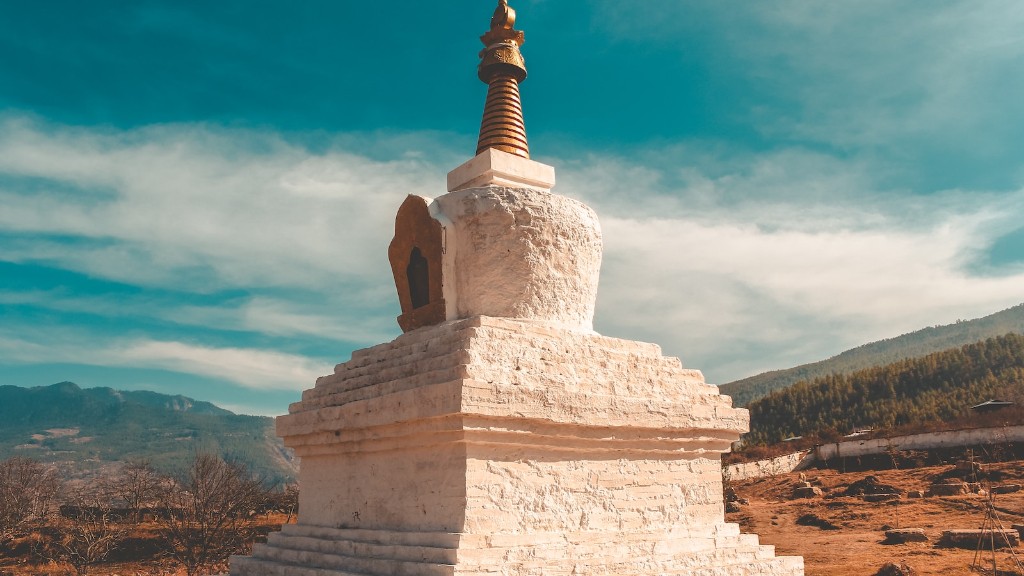Introduction
Hinduism is a polytheistic religion that is made up of several gods and goddesses, collectively known as the trinity gods. In Hinduism, the three main gods are Brahma, Vishnu and Shiva who represent creation, preservation and destruction, respectively. They are sometimes referred to as the Trimurti, meaning “three forms” in Sanskrit. They represent a cycle of birth, life, death, followed by rebirth.
Brahma
Brahma is the god of Creation in Hinduism. He is considered the source of the universe and all living things and is often depicted as having four heads and four arms. He wears a red garment and holds a water pot in one hand and a book or a lotus flower in the other. In some stories, Brahma is seen as the Cosmic Grandfather of all gods and humans.
Vishnu
Vishnu is the god of Preservation and is also known as “the preserver.” He is usually portrayed as having a dark, blue complexion and four arms. He is usually depicted carrying a Conch, a discus, a mace, and a lotus. In some stories, Vishnu is seen as the Cosmic Father of all gods and humans.
Shiva
Shiva is the god of Destruction and is also known as “the destroyer.” He is depicted as having a blue complexion and three eyes. He wears a tiger skin, has a trident in one hand and a drum in the other. Shiva is often depicted in a dancing pose, representing the cycle of life and death.
Hinduism’s Trinity Gods Representation
The trinity gods of Hinduism are representative of the cycle of life, death, and rebirth. Hinduism teaches that while the material world is subject to change and transformation, the ultimate reality–Brahman–remains the same throughout the cycle. Brahman is the source of all creation and its ultimate purpose is to help souls reach moksha, which means liberation from the cycle of birth and death. The trinity gods symbolize this idea by representing the various aspects of creation and destruction.
Religious Observance
The three main gods of Hinduism are worshipped by Hindus all over the world. Hindus often visit temples dedicated to the trinity gods and offer prayers and offerings to their particular deity. During festivals and other important religious observances, the three gods are typically invoked in order to receive their individual blessings.
Philosophical Representation
The trinity gods are also seen as representing the three aspects of human consciousness or the three states of being in Hindu philosophy. Brahma is seen as the waking state, Vishnu is the dreaming state, and Shiva represents the deep sleep or dreamless state. This idea underscores the notion that life is part of a larger cycle, with each of its states having an important place in it.
Symbolism
The trinity gods are often seen as symbols of harmony and balance. They represent a complete cycle of life that is characterized by harmony, balance, and equilibrium. Hindus believe that this cycle is essential to the well-being of both individuals and the universe. The unity and harmonious relationship between the three gods represent the idea that life is greater than the sum of its parts.
Gaining Knowledge
Hindus strive to gain knowledge and understanding of the trinity gods and their associated concepts in order to improve their lives. The trinity gods each have their own unique teachings and lessons that Hindus can benefit from. For example, Brahma is said to represent wisdom and creativity, Vishnu is seen as embodying compassion and devotion, and Shiva is known for his power and strength.
Mythology
The trinity gods also feature prominently in Hindu mythology. All three gods have their own stories and adventures that emphasize their various attributes and characteristics. Hindus explore these stories and draw wisdom and insight from them.
Spiritual Understanding
Hindus believe that through spiritual understanding and practicing the teachings of the three gods, they can learn to live in harmony with the world. This idea is encapsulated in the phrase “vasudhaiv kutumbakam”, which means “the world is one family.” Hindus strive to live in a way that respects and honors this sentiment.
Prosperity
Hindus worship the three gods to bring prosperity and abundance into their lives. Hindus believe that by honoring and celebrating the trinity gods, their families and communities can reap the rewards of harmony, abundance and peace. Hindus also pay special attention to their physical and spiritual health and advancement in order to bring about greater prosperity for themselves and for society as a whole.
Conclusion
The trinity gods of Hinduism represent the essential cycle of life, death and rebirth. They are worshipped in temples and individual homes, and feature prominently in Hindu philosophy, mythology, and religion. Through understanding and honoring the three gods, Hindus hope to find spiritual enlightenment, prosperity, and harmony.

